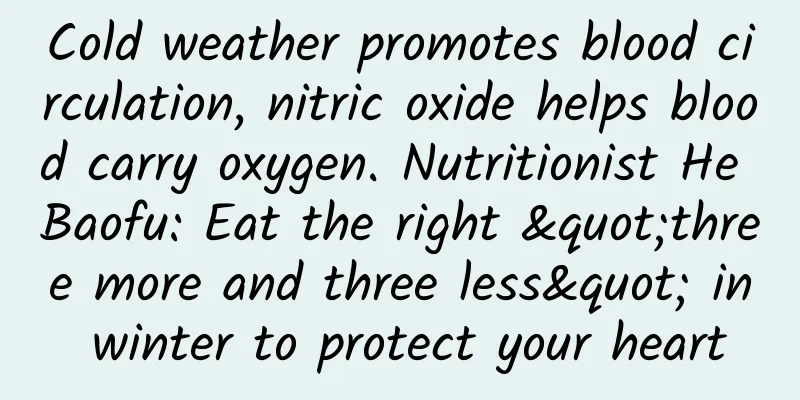Cold weather promotes blood circulation, nitric oxide helps blood carry oxygen. Nutritionist He Baofu: Eat the right "three more and three less" in winter to protect your heart

|
Winter is the easiest time to get heartbroken! As the temperature drops and the temperature difference between day and night is large, blood vessels will contract rapidly. You must pay more attention to circulatory health, maintain blood vessel elasticity, and ensure adequate blood oxygen. Lin Ruojun, a nutritionist at premium nutrition expert Herbalife Nutrition, said that supplementing with an appropriate amount of "arginine" can increase nitric oxide levels, protect blood vessels, and allow blood to carry more oxygen and nutrients throughout the body, which is a nutrient that must be supplemented in autumn and winter. In addition, deep-sea fish and krill oil are rich in Omega-3 fatty acids, which can also help regulate physiological functions and improve health in cold weather. After winter begins, the temperature difference between day and night is large. Especially when you get out of bed in the early morning, you should pay more attention to the rapid temperature changes. People with poor cardiovascular health are prone to chest tightness, palpitations, shortness of breath and other discomforts. In addition, the concept of "winter tonic" often makes people want to eat high-fat and high-salt hot pot in autumn and winter, which warms up the body but harms circulatory health. In this regard, Herbalife nutritionist Lin Ruojun reminded the public of 6 tips for heart-protecting diets for reference: 6 heart-protecting dietary tips for autumn and winter 1. Take more "arginine": According to the research of Dr. Louis Ignarro, the winner of the 1998 Nobel Prize in Medicine, the cardiovascular system uses nitric oxide to adjust the circulation function of various parts of the human body and supply oxygen and nutrients to each cell. Nitric oxide can dilate blood vessels, allowing the blood to carry more oxygen and nutrients throughout the body. L-arginine is one of the main raw materials for the formation of nitric oxide and can promote the production of nitric oxide. Moderate supplementation can protect cardiovascular health. 2. Take more "Omega-3 fatty acids": Fats are divided into saturated fatty acids and unsaturated fatty acids. Saturated fatty acids mainly come from animal oils, such as lard and butter. Although they are highly stable, excessive intake may have an impact on health. Unsaturated fatty acids mostly come from deep-sea fish and are good for the body. In winter, you should eat more good oils, such as deep-sea fish oil and krill oil rich in unsaturated fatty acids, which can help lower cholesterol and triglycerides, and have the function of reducing the risk of heart attack and preventing recurrence of heart disease. Nutritionist Lin Ruojun recommends that adults should consume at least 500 mg of Omega-3 fatty acids per day to achieve health benefits. 3. Drink more water: In winter, people sweat less and are less likely to feel thirsty, which often makes people forget to replenish water, resulting in excessive blood concentration in the body, which has adverse effects on cardiovascular health and is a hidden landmine that cannot be ignored. Water is vital to every cell and organ in the body and is required for transporting nutrients to cells and maintaining body temperature. The Ministry of Health and Welfare recommends that adults should drink at least 2,000 cc of water a day, even in autumn and winter, to keep blood flowing smoothly. People often forget to drink water in autumn and winter. Nutritionist Lin Ruojun reminds us that if we can set an alarm for every hour or prepare a large-capacity water bottle (such as 1,000cc), it can effectively help us replenish water at a regular time and in a fixed amount. 4. Less "high-fat": Taiwanese snacks are world-famous. Pearl milk tea, fried chicken and French fries are all sinful snacks that tempt people during afternoon tea time. Especially when the weather gets cold, eating high-fat foods is more soothing. But Lin Ruojun reminds us that a greasy diet will increase blood lipids and cholesterol, which will in turn affect blood vessel health and cause weight gain. 5. Less "high salt": There are always long queues at hot pot restaurants in winter, but while you are enjoying the spicy hot pot and sauerkraut and pork hot pot, you are also eating ingredients, soup bases and seasoning sauces containing high salt. According to the recommendations of the Ministry of Health and Welfare, daily sodium intake should not exceed 2,400 mg (equivalent to 6 grams of salt). According to the National Nutrition and Health Status Changes Survey released by the Ministry of Health and Welfare this year, the sodium intake of adults is higher than the recommended amount, about 1.3 to 1.8 times higher for men and about 1.2 to 1.3 times higher for women. High sodium can easily increase blood pressure and cause rapid aging of blood vessels, so it is recommended to still follow the recommended intake. 6. Drink less: Alcohol is not only high in calories, but also causes blood vessels to constrict. In order to transport blood to various organs throughout the body, the heart needs greater power to pump blood, which increases the burden on the heart. In late autumn and early winter when the temperature changes greatly, you must be more cautious when drinking to avoid increasing the burden on the heart. Protect your heart in winter by keeping warm and exercising In addition to keeping in mind the three mores and three lesses in your diet, you should also keep warm when going out in the winter. Clothes, scarves, and hats are the three treasures of winter, which keep the body warm and prevent blood vessel constriction. Your daily life should also be kept normal, with adequate sleep and no staying up late to avoid rising blood pressure, which also helps protect your heart. Before taking a bath, it is recommended to increase the temperature of the bathroom first. The water temperature should not be too high so as not to increase the burden on the heart. In winter, you should also avoid exercising in the cold early morning, because the temperature difference is too great when you just get out of the warm bed, and your blood vessels cannot adapt well, which can easily lead to adverse effects. It is recommended to adjust the time to exercise when the sun is out at 8 or 9 in the morning, or before sunset in the evening, when the temperature is warm. Do not exercise too vigorously, but of moderate intensity. It is recommended to choose low-intensity exercise that the body can bear. If you are only used to general walking, avoid suddenly running a marathon when a cold wave hits. Warm up well before exercise to keep your body in the best condition. |
Recommend
What happens when women with cervicitis get pregnant? Women with cervicitis should know these things when they get pregnant
Women should undergo various physical examination...
Drugs are commonly used in the treatment of postpartum cervical erosion
After giving birth, I am very concerned about the...
Squats are so powerful! How to learn half squat to lift hips and slim legs easily
The squat whirlwind is too powerful, are you doin...
These 3 reasons can cause early habitual miscarriage
The incidence of habitual abortion is currently s...
Body Sculpting Tutorial - Slimming Arms and Triceps Stretch
The hot summer is here, and many girls have throw...
The three main causes of ovarian cysts are introduced in detail by experts
The cause of ovarian cysts is unknown to many peo...
Chronic adnexitis is a huge threat to women's pregnancy
Female appendages refer to the fallopian tubes an...
Is it okay not to take anti-inflammatory drugs after abortion? Things women need to pay attention to after abortion
Nowadays, more and more female friends choose to ...
A brief analysis of the symptoms of ovarian cysts
Knowing the symptoms of ovarian cysts is crucial ...
Can common vaginitis heal itself?
Common vaginitis usually cannot completely heal o...
Bacterial vaginosis diagnostic indicators
In modern society, most urban female white-collar...
How to exercise for uterine prolapse
Uterine prolapse can be improved through pelvic f...
What causes vaginitis?
Vaginitis is caused by a variety of factors, incl...
Precautions and maintenance methods before and after abortion surgery
Abortion is the act of terminating a pregnancy be...
Quick summary by daily weight loss experts! What can you eat during your sugar reduction period?
Some seemingly "healthy" weight loss fo...









